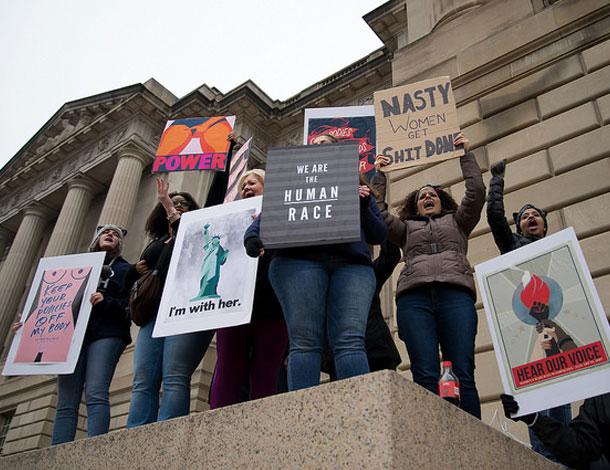Donald Trump’s ‘global gag rule’ could align US with Iran, Sudan, Syria and other countries targeted by US travel ban at Commission on the Status of Women.
US negotiators at this week’s UN Commission on the Status of Women could find themselves standing shoulder to shoulder with some of the world’s worst violators of women’s rights, activists have warned.
Donald Trump’s reinstatement of the “global gag rule” and his proposed funding cuts to the UN are expected to embolden right-wing conservative groups seeking to undermine women’s rights during the CSW talks in New York.
The rule, which Trump reintroduced on his fourth day in the White House, restricts overseas NGOs from receiving US aid if any of their work touches on abortion. It will critically hinder the lifesaving work of organisations involved in family planning, maternal and child health, and in HIV and cervical cancer prevention and care. Trump has also said he is reviewing funding to the UN population fund, the UNFPA.
In the first real test of the Trump administration’s stance on women’s rights on the international stage, the US delegation may find itself firmly aligned with conservative countries including Iran, Sudan and Syria – among the six countries targeted in Trump’s revised travel ban.
These countries are notorious in their attempts to water down language on women’s rights – not least on sexual and reproductive health, what constitutes a family, and the protection of female activists – during the annual CSW discussions, which begin on Monday.
“It’s very likely we will see the US standing shoulder to shoulder with Russia, Iran, Egypt, Saudi Arabia, Syria and Sudan, the very countries it has named in its latest ban,” said Shannon Kowalski, director of advocacy and policy at the International Women’s Health Coalition. “Shoulder to shoulder with some of the worst abusers of women’s rights around the world.”

At this year’s CSW – a two-week forum designed to advance women’s rights globally, but in reality a display of geo-politics and a battleground to preserve decades-old agreements on promoting gender equality – UN member states will be asked to agree an action plan on accelerating economic opportunities for women.
Earlier this year, the World Economic Forum predicted that, at the current pace of change, it will take another 170 years for economic equality between men and women to be achieved.
But campaigners worry the reinstatement of the “gag rule” – also known as the Mexico City policy – could encourage conservative campaigners to lobby delegates into taking a more hardline stance in negotiations. The travel ban has already prevented some activists from attending the CSW, while others have decided to boycott the event.
Kowalski said there was a risk that such groups could reach out to the US delegation to oppose language on sexual and reproductive health and rights. “It may cause some groups to harden their positions and dig in more.”
Serra Sippel, president of the Center for Health and Gender Equity, said: “Our hope is that the US will align with countries that respect and uphold human rights.”
However, she voiced concern about the new US ambassador to the UN, Nikki Haley. “Given Haley’s statement during her confirmation hearing that she will do anything to keep women from having access to information and services related to abortion, we rightfully are concerned about the US joining in an unholy alliance with member states and observers that are hostile to gender equality and universal access to sexual and reproductive health and rights.”
It is unclear whether the ambassador will be directly involved in the CSW negotiations this year.
Cynthia Rothschild, a feminist activist and former consultant with the UN high commissioner for human rights, said: “The interesting question will be about how other [UN member] states show backbone in resisting conservative US policy.”
The Netherlands, Canada, Sweden and Finland have already pledged millions of dollars to help plug the gap in funding expected from US cuts.
Rothschild’s view was echoed by Phumzile Mlambo-Ngcuka, the executive director of UN Women. She said initial discussions with the US team had gone well, but added: “I am relying on the other member states who are equally powerful and up to the task to really step it up and stand for things we believe in, support the countries with information, data and so on.”
She added that the fact the “gag rule” has been extended to include not just family planning programmes but all US-funded health programmes “has galvanised a much stronger base who want to protect the rights of women fully”.
The International Planned Parenthood Federation (IPPF), said women’s chances of getting a decent job rest on their ability to access healthcare services and have control over their bodies.
“The inclusion of sexual and reproductive health and rights must be central to the CSW agenda as women’s opportunities to access decent work and to stay in work are shaped by them being able to act on their sexual and reproductive health and rights,” said Preethi Sundaram, policy and advocacy adviser at IPPF.
“Given the current political climate, in particular the re-enactment and expansion of the global gag rule, we are concerned that these rights are more vulnerable than ever.”
Chiara Capraro, policy and advocacy manager for economic rights at Womankind, said: “We remain concerned the needless pulling of funds from reproductive health by the US might overshadow important discussions to garner a shared understanding and advance the thinking and commitment of governments in addressing economic inequalities, improve women’s rights in the world of work, and move towards an economic model that works for women.”
She added that she believed the reintroduction of the “gag rule” presented “a nightmare situation for women globally”.
This content is republished as part of our content partnership with the Guardian and Mama Cash.
